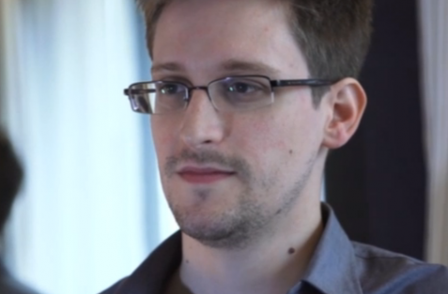
British spies are able to look at texts scooped up in a secret operation which collects hundreds of millions of the messages, according to the latest leak from former US spy Edward Snowden.
America's National Security Agency (NSA) has created a secret database called Dishfire which stores messages for future use and British spies, who face tough British laws, have been given a back door to exploit that information, it was claimed.
The claims are made by Channel 4 News and the Guardian who have seen a classified April 2011 presentation which discusses Dishfire, a database that collects nearly 200 million texts everyday from around the world.
Dishfire traces people when take their mobile phone abroad by capturing the welcome text message from your phone company that is triggered by your arrival overseas, telling agents where you were and when you got there.
It is claimed the texts help the NSA to track people's whereabouts, their contacts, their banking details and their movements if they travelled from country to country.
Under US law, the American spies had to delete the data for its own citizens but texts coming to and from international mobile phones – including Britons, were fair game and could be spied upon at will.
On British soil, spy agencies can only access text message data of specific targets with permission under the Regulation of Investigatory Powers Act (RIPA), and if they want to see the content of the message they must get a warrant from a secretary of state.
By contrast Dishfire collects data on everyone so by accessing the system, British spies can pull off information they wouldn't be entitled to under strict British laws.
Communications giant Vodafone told Channel 4 News they were "shocked and surprised" by this potential for exploitaiton while former Interception Commissioner Sir Swinton Thomas said he would have been concerned about this kind of use of foreign intelligence agency data.
"What you're describing sounds concerning to us because the regime that we are required to comply with is very clear and we will only disclose information to governments where we are legally compelled to do so, won't go beyond the law and comply with due process," Stephen Deadman, group privacy officer and head of legal for privacy, security and content standards at Vodafone Group, told Channel 4 News.
"But what you're describing is something that sounds as if that's been circumvented. And for us as a business this is anathema because our whole business is founded on protecting privacy as a fundamental imperative.
"We're going to be contacting the Government and are going to be challenging them on this. From our perspective, the law is there to protect our customers and it doesn't sound as if that is what is necessarily happening."
Describing it as "a worry" Thomas noted: "Certainly in my time I would take the view that it not open to our intelligence services to obtain or certainly to use communications or data which would not have been lawful in this country.
"It's not dissimilar to the question of whether you use material which you may have reason to believe has been obtained by torture. It's a different area of course, but the concept is very similar."
The NSA has stated that Dishfire does exist and that it lawfully collects SMS data. It also stated that privacy protections are in place for US citizens, according to Channel 4 News.
GCHQ said: "All of GCHQ's work is carried out in accordance with the strict legal and policy framework which ensures that our activities are authorised, necessary and proportionate and that there is rigorous oversight."
Snowden, is a former NSA contractor, who is now hiding in Russia after leaking classified government documents.
He has become a hero for civil liberty campaigners in Europe and the US for whistleblowing about the reach of surveillance activities by the US, including on its closest allies.
Nick Pickles, director of Big Brother Watch which campaigns on privacy, civil liberties, levels of surveillance, said he was concerned by any suggestion that foreign agencies could be used "to get around British laws".
He said: "If an interception warrant for an individual is not in place, it is illegal to look at the content of a message. Descriptions of content derived metadata suggest the content of texts is being collected and inspected in bulk and if this is the case GCHQ has serious questions to answer about whether it is operating under a perverse interpretation of the law cooked up in secret.
"The telecoms companies providing our mobile phone services need to urgently reassure their customers that they are not handing over our data in bulk to the UK or US governments."
Shami Chakrabarti, director of Liberty, argued that the latest Snowden allegations show there is a need for universal human rights.
She claimed: "It is too easy for governments to contract out abuse of their own citizens by getting friendly allies to do their dirty work. The Snowden revelations demonstrate governments' ambitions – no privacy for us and no scrutiny for them."
Prime Minister David Cameron and US president Barack Obama discussed the controversy over data privacy in a phone call shortly before the latest revelations became public.
Obama is expected to announce new restrictions to the collection of phone records by American intelligence in a much-anticipated speech on the issue tomorrow.
In a statement about the two leaders' conversation, a Number 10 spokeswoman said: "The president updated the Prime Minister on the US signals intelligence review ahead of setting out tomorrow his administration's response to the review.
"The two leaders welcomed the unique intelligence sharing relationship between their two countries."
Email pged@pressgazette.co.uk to point out mistakes, provide story tips or send in a letter for publication on our "Letters Page" blog
